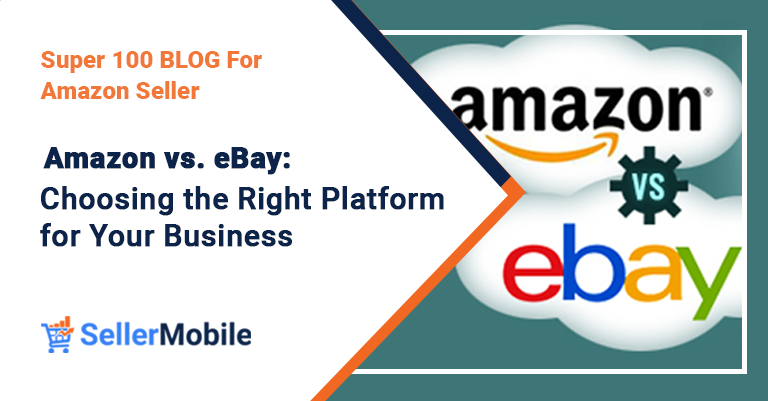Entering the world of online selling comes with a pivotal decision: should you opt for the e-commerce giant, Amazon, or the longstanding auction-style platform, eBay? Each platform has its unique advantages and considerations, making the choice a critical factor in your business’s success. In this comprehensive guide, we will explore the key differences between Amazon vs. eBay, helping you make an informed decision tailored to your business needs. Additionally, discover how SellerMobile software can be the secret ingredient for efficient management of your Amazon Seller Central account.
Understanding the Basics: Amazon and eBay

Amazon: The E-Commerce Powerhouse
Amazon is the undisputed leader in the e-commerce realm, boasting a vast customer base and a product catalog spanning virtually every category. The platform focuses on a straightforward purchasing process, with fixed prices, fast shipping options, and a customer-centric approach. Sellers on Amazon benefit from a robust fulfillment network (Fulfillment by Amazon or FBA), streamlined logistics, and access to a global audience.
eBay: The Auction-Style Pioneer
eBay, on the other hand, pioneered the auction-style selling model and continues to embrace it alongside fixed-price listings. eBay’s unique bidding system allows buyers to participate in auctions, setting their maximum bid for an item. Sellers on eBay enjoy a more flexible approach to pricing and listing formats. The platform’s community-oriented nature fosters engagement and encourages buyers to participate actively.
Factors to Consider: Amazon vs. eBay

1. Pricing Structure-Amazon vs. eBay
- Amazon: Primarily fixed-price listings with occasional auctions for specific categories.
- eBay: Supports both fixed-price and auction-style listings, providing flexibility in pricing.
2. Audience and Reach-Amazon vs. eBay
- Amazon: A massive global audience with a focus on straightforward purchasing.
- eBay: A diverse user base, attracting bargain hunters, collectors, and those seeking unique items through auctions.
3. Listing Format-Amazon vs. eBay
- Amazon: Standardized product listings with a focus on detailed product information.
- eBay: Varied listing formats, including auctions, fixed-price listings, and the option to include detailed product descriptions.
4. Shipping and Fulfillment– Amazon vs. eBay
- Amazon: Emphasizes fast and reliable shipping, with the option to leverage FBA for streamlined fulfillment.
- eBay: Sellers have more control over their shipping and fulfillment processes, allowing for customization.
5. Selling Fees– Amazon vs. eBay
- Amazon: Charges referral fees, variable closing fees for media items, and additional fees for using FBA.
- eBay: Charges insertion fees for listing items and final value fees based on the sale price.
6. Customer Trust and Brand Recognition
- Amazon: High customer trust, with a focus on customer reviews and a reputation for reliability.
- eBay: Relies on buyer and seller feedback to establish trust. Brand recognition is strong, especially for unique or collectible items.
7. Buyer Behavior
- Amazon: Buyers often visit with a specific product in mind, seeking quick and efficient purchases.
- eBay: Encourages browsing and discovery, with buyers often enjoying the thrill of auctions and unique finds.
8. Product Categories
- Amazon: Comprehensive range of product categories, suitable for a wide array of products.
- eBay: Ideal for unique, collectible, vintage, or hard-to-find items across various categories.
9. Seller Control and Flexibility
- Amazon: Standardized processes and guidelines, providing a more structured selling experience.
- eBay: Sellers have more flexibility in setting prices, negotiating, and customizing their listings.
10. Returns and Customer Service
- Amazon: Emphasizes a customer-centric approach, with standardized return processes and reliable customer service.
- eBay: Sellers have more control over their return policies and customer interactions.
Choosing the Right Platform for Your Business

When to Choose Amazon:
- You have a wide range of new, popular products.
- Your business benefits from Amazon’s global fulfillment network (FBA).
- Efficient and fast shipping is a priority for your customers.
- Your products align with a straightforward, fixed-price model.
When to Choose eBay:
- You specialize in unique, vintage, or collectible items.
- Auction-style or flexible pricing aligns with your business strategy.
- You want more control over your shipping and fulfillment processes.
- Your products cater to a diverse and engaged audience.
Optimize Your Selling Experience with SellerMobile

Navigating the complexities of Amazon Seller Central requires efficient tools and strategies. SellerMobile software serves as a comprehensive solution, enhancing your ability to manage inventory, optimize pricing, and gain valuable insights into your Amazon business.
Why SellerMobile?
- Inventory Management: Streamline inventory processes and receive low-stock alerts.
- Dynamic Pricing: Stay competitive by dynamically adjusting prices based on market trends.
- Order Fulfillment: Optimize your order fulfillment process for a seamless customer experience.
- Analytics: Gain insights into sales performance, customer behavior, and advertising ROI.
Conclusion: Your Path to E-Commerce Success– Amazon vs. eBay
Choosing between Amazon and eBay is a pivotal decision that hinges on your business model, target audience, and product offerings. By understanding the unique features of each platform and leveraging SellerMobile to streamline your Amazon Seller Central account, you can embark on a successful e-commerce journey, whether you opt for the e-commerce giant or the auction-style pioneer.





